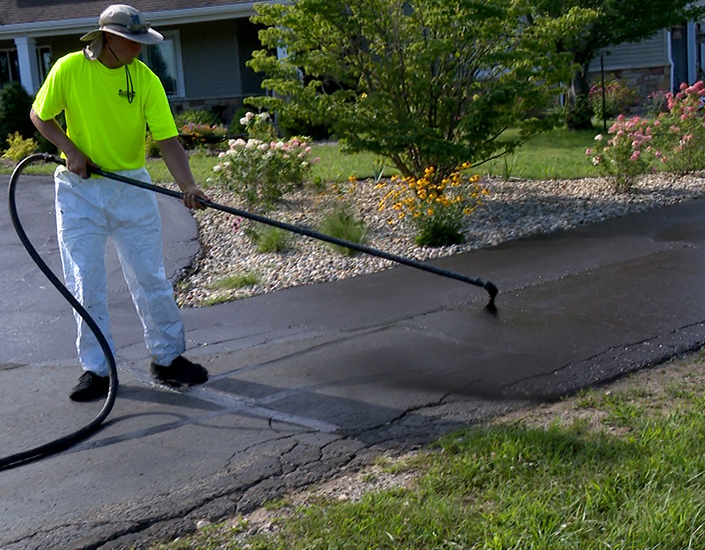Seal in Quality: Professional Solutions for Asphalt Repair and Sealing
Seal in Quality: Professional Solutions for Asphalt Repair and Sealing
Blog Article
Cold Mix Asphalt Vs. Hot Mix Asphalt: Which Is Right for You?

Composition Differences
Cold mix and warm mix asphalts differ dramatically in their composition, with distinctive qualities that affect their efficiency and applications. Cold mix asphalt is produced by emulsifying the asphalt binder with water and an emulsifying agent prior to blending it with accumulation. This method permits the asphalt to be practical at reduced temperatures, making it optimal for short-lived repairs and for use in chillier climate problems. Hot mix asphalt, on the other hand, is manufactured at high temperatures, normally in between 300-350 ° F, which helps to achieve much better compaction and a much more long lasting end product. The warm mix asphalt manufacturing procedure involves heating the aggregate and asphalt binder separately before combining them at the asphalt plant.
Moreover, chilly mix asphalt often tends to be much less dense and extra adaptable than hot mix asphalt. This adaptability makes it far better matched for locations with greater levels of movement, such as driveways or roads with heavy website traffic. In comparison, warm mix asphalt is understood for its high sturdiness and resistance to rutting and cracking, making it a preferred choice for freeways and high-traffic roadways where durability is essential.
Installation Refine Differences
The process of mounting cool mix and hot mix asphalt displays remarkable variances in their requirements and procedures. In comparison, hot mix asphalt requires an extra fancy installment process. Due to the home heating demands, hot mix asphalt setups are usually lugged out by professionals with customized devices, guaranteeing a more structurally audio and irreversible outcome.
Sturdiness and Long Life Variables
When thinking about asphalt options, durability and long life are vital elements to evaluate for long-term pavement performance. Warm mix asphalt (HMA) is known for its exceptional longevity and durability.
In terms of longevity, HMA commonly exceeds CMA because of its premium strength and resistance buildings. HMA sidewalks have a longer service life, needing less regular asphalt repair repairs and maintenance, which can equate to cost financial savings in the lengthy run. In addition, HMA pavements are a lot more quickly personalized to satisfy particular project demands, better improving their click resources resilience.
Price Factors To Consider
Thinking about the economic implications is an essential element when examining the option between warm mix asphalt (HMA) and cool mix asphalt (CMA) for sidewalk jobs. While the initial cost of hot mix asphalt is typically greater than that of cold mix asphalt, HMA often gives an extra affordable solution in the long run due to its superior durability and longevity.
In addition to product prices, it's necessary to think about the expenditures connected with installment and maintenance when contrasting HMA and CMA. Ultimately, the choice between HMA and CMA should take right into account not just the first cost yet likewise the long-lasting economic effects to establish the most cost-efficient choice for the details pavement project.
Environmental Effect Contrast
Comparison of the environmental effects between warm mix asphalt (HMA) and cold mix asphalt (CMA) reveals distinct differences in sustainability techniques. HMA manufacturing requires high temperatures, leading to increased energy consumption and greenhouse gas discharges.
Moreover, the usage of CMA frequently entails reusing existing asphalt pavement, advertising resource conservation and reducing the quantity of waste sent to garbage dumps. By deciding for CMA over HMA, roadway building tasks can contribute positively to ecological conservation initiatives.
Final Thought
In verdict, the option in between cold mix asphalt (CMA) and hot mix asphalt (HMA) relies on numerous factors such as structure, installment process, resilience, longevity, expense, and ecological influence. angle parking. While CMA provides a fast and cost-effective remedy for minor repairs, HMA makes sure premium sturdiness and durability for hefty web traffic locations. Take into consideration these factors very carefully to figure out which sort of asphalt is the ideal choice for your paving needs

Taking into consideration the monetary implications is a critical aspect when examining the selection in between warm mix asphalt (HMA) and cold mix asphalt (CMA) for pavement tasks. While the initial cost of warm mix asphalt is typically higher than that of chilly mix asphalt, HMA often offers an extra economical remedy in the lengthy run due to its exceptional toughness and longevity. asphalt patch repair.Comparison of the environmental impacts website here between hot mix asphalt (HMA) and cool mix asphalt (CMA) reveals distinctive differences in sustainability techniques.In conclusion, the selection between cold mix asphalt (CMA) and hot mix asphalt (HMA) depends on various elements such as composition, installation process, durability, long life, price, and environmental impact
Report this page